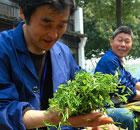Society
Gay rights in China: Road to respect
By Cao Li (China Daily)
Updated: 2010-02-24 06:46
 |
Large Medium Small |
 |
|
An emotional Ba Li during his 72nd birthday party in Beijing. Feng Yongbin |
Of the 1,259 gay men who responded to a 2008 survey by Zhang Beichuan, a professor at Qingdao University in Shandong province, 62 percent said they had never "come out" - when a person openly reveals their homosexuality. Nine percent said they had been fired from their jobs or forced to quit after employers discovered they were gay, and 5 percent believed their sexuality had affected their income and career development. About one-fifth said they had suffered verbal and physical abuse. More shockingly, about 35 percent of respondents admitted they had contemplated suicide, while 13 percent had attempted it.
Liu Huaqing, a psychiatrist at the Beijing Huilongguan Hospital said he receives many patients suffering depression or looking to "correct" their sexual orientation. "Some are adolescents accompanied by parents and some are married men," he said.
Discrimination has led to a large proportion of the nation's estimated 30 million gay men and women being forced to keep their sexuality a secret, said Zhang. However, this has impacted the Ministry of Health's attempts to prevent the spread of HIV and AIDS, with homosexual men having overtaken drug users as the most high-risk group. On Dec 1, 2009, the ministry said that 42 percent of new infections were through heterosexual sex, while 32 percent was through homosexual intercourse.
In a recent government study, the infected rate among gay men in Beijing has increased to 4.9 percent, 10 times that of five years ago, according to Focus Magazine.
There were 48,000 new cases of HIV and AIDS reported last year, more than 32 percent were infected through homosexual sex, the Ministry of Health said on Dec 1. As the vast majority is also married, health experts say the virus is quickly spreading among the female population, too.
More than 46 percent of the men polled by Professor Zhang agreed a more tolerant society and a law banning discrimination would help control the rate of infection. In a 2008 survey by sexologist Li Yinhe, she discovered large sections of society strongly believe an "openly gay person should not be allowed to teach in schools", while many agreed homosexuality was "completely wrong".
Zhang once received a letter from a man who said his father was so upset about his relationship with another man that he killed his boyfriend. "I wrote to him and told him he did not do anything wrong. His father was sent to prison," he said.
The acceptance of gay men and women in Chinese society has been hampered by a long history of silence on the issue but the topic is finally being addressed in schools, said the professor. "A junior high school textbook printed in 2005 taught children about not discriminating against homosexuals," he said. However, it is still forbidden by law to refer to homosexuality in films, television shows or literature, even though it is no longer listed as pornographic. Brokeback Mountain, for example, an Oscar-winning film about a love affair between two cowboys directed by Ang Lee, was not shown in cinemas on the Chinese mainland.
When it comes to the homosexual population, the central government is focused solely on HIV and AIDS prevention, "they are still cautious on the other aspects", said Zhang.
Mr Gay China, the country's first beauty pageant for homosexual men, was called off just an hour before opening in January. Organizers later picked contestant Xiao Dai, 25, from the Xinjiang Uygur autonomous region, as their representative for Mr Gay World 2010 in Oslo, Norway this month. He finished fourth in the competition.
The nation lacks a consistent policy towards homosexuality, according to Wan Yanhai, an AIDS prevention activist and director of the Aizhixing Institute of Health Education in Beijing. "The authorities ignore most of activities but intervene when events cause too much attention," he said.
Gay rights websites were also been affected by China's ongoing war on porn, with several closed in 2008 as part of the crackdown.
To help prevent the spread of HIV and AIDS among gay men, the government in 2007 invited more NGOs to get involved and called on the media to promote tolerance.
Li Yinhe said she will again propose legalizing same-sex marriage during the two sessions of the National People's Congress, the nation's legislature, next month, while Zhang called for the government to introduce firm laws to ban discrimination. A spokesman for the Ministry of Civil Affairs declined to comment.
However, many experts and gay people agreed that changing attitudes is a slow process.
"It took me years to come to ease with my homosexuality, so I don't expect others to accept me quickly," said beauty pageant contestant Xiao Dai.
On the signature board at the entrance of the Mr Gay China event in January, gay rights activist Wei Jiangang wrote a 1925 quote by revolutionary leader, Sun Yat-sen: "Revolution has not yet succeeded; our comrades need to push on."
(China Daily 02/24/2010 page7)












